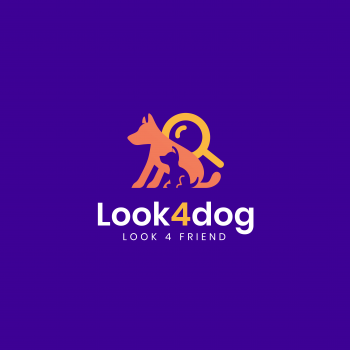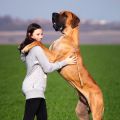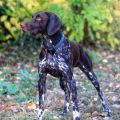The Tyrolean Hound, also known as the Tiroler Bracke, is a versatile and highly skilled dog breed that hails from the Tyrol region of Austria. This breed is renowned for its exceptional hunting abilities, particularly in tracking and trailing game. With its distinctive appearance and remarkable scenting capabilities, the Tyrolean Hound has gained popularity not only as a hunting companion but also as a loyal and affectionate family pet.
The history of the Tyrolean Hound can be traced back several centuries, with its origins deeply rooted in the Alpine regions of Austria. This breed is believed to have descended from ancient scent hounds that were brought to the Tyrol region by the Romans. Over time, local hunters selectively bred these dogs to enhance their hunting skills and adaptability to the rugged terrain of the area.
According to the FCI (Fédération Cynologique Internationale) typology, the Tyrolean Hound belongs to Group 6: Scenthounds and Related Breeds. Within this group, it falls under Section 2: Leash Hounds, which includes various scent hound breeds that excel in trailing and tracking game. The Tyrolean Hound is classified under the category of medium-sized hounds.
Primarily bred for hunting purposes, the Tyrolean Hound possesses a keen sense of smell and remarkable tracking abilities. These dogs are particularly skilled in tracking wounded game, making them invaluable assets to hunters. Their strong noses and persistence enable them to follow scent trails for long distances, even in challenging terrains.
In terms of appearance, the Tyrolean Hound is a medium-sized dog with a well-proportioned and muscular build. Males typically stand between 19.5 to 20.5 inches (50-52 cm) at the shoulder, while females are slightly smaller, measuring around 18.5 to 19.5 inches (47-50 cm). The breed's weight ranges from 44 to 55 pounds (20-25 kg). The Tyrolean Hound has a distinctive head with a broad skull, well-developed muzzle, and expressive eyes that exude intelligence and determination.
One of the most notable features of the Tyrolean Hound is its dense and weather-resistant coat. The breed's coat is short and smooth, providing protection against the harsh Alpine climate. The coloration of the coat is typically tricolor, consisting of a black base with tan markings on the face, chest, and legs, as well as white markings on the chest, neck, and tail tip.
In terms of temperament, the Tyrolean Hound is known for its friendly and sociable nature. These dogs are highly adaptable and get along well with both humans and other animals, making them suitable for families with children and other pets. However, it is important to note that their strong hunting instincts may lead them to chase smaller animals, so proper socialization and training are essential.
The Tyrolean Hound is an active and energetic breed that requires regular exercise to keep both their bodies and minds stimulated. Daily walks, jogs, or play sessions in a securely fenced area are necessary to prevent boredom and ensure their overall well-being. Engaging in activities that tap into their natural hunting instincts, such as scent games or tracking exercises, can be particularly beneficial for this breed.
With proper care and nutrition, the Tyrolean Hound has an average life expectancy of 12 to 14 years. Regular grooming is relatively low-maintenance, as their short coat only requires occasional brushing to remove loose hair and keep it looking neat. Additionally, routine dental care, nail trimming, and ear cleaning are essential for maintaining their overall health.
In conclusion, the Tyrolean Hound is a remarkable breed that combines exceptional hunting abilities with a friendly and sociable temperament. With their keen sense of smell, endurance, and adaptability, these dogs excel in tracking and trailing game in the rugged Alpine terrain. Whether as a hunting companion or a beloved family pet, the Tyrolean Hound brings loyalty, intelligence, and a zest for life to any household lucky enough to have one.
The Tyrolean Hound, also known as the Tiroler Bracke, is a remarkable breed of dog that hails from the Tyrol region of Austria. These dogs possess a unique character that sets them apart from other breeds. With their distinctive appearance and exceptional hunting skills, Tyrolean Hounds have become a beloved choice for hunters and dog enthusiasts alike.
In terms of character, Tyrolean Hounds are known for their intelligence, loyalty, and strong work ethic. They are highly energetic and require regular exercise to keep them happy and healthy. These dogs have a natural instinct for hunting, which makes them excellent companions for those who enjoy outdoor activities such as hiking or tracking.
One of the defining characteristics of Tyrolean Hounds is their friendly and sociable nature. They are known to be good-natured and get along well with other dogs and animals. This makes them an ideal choice for families with other pets. Additionally, their friendly disposition makes them great with children, as they are patient and gentle.
When it comes to training, Tyrolean Hounds are highly trainable due to their intelligence and eagerness to please their owners. However, it is important to start training them from a young age to establish good behavior and obedience. Positive reinforcement methods, such as treats and praise, work best with this breed. They respond well to consistent and patient training, and their natural hunting instincts can be channeled into various activities such as scent work or agility training.
As with any dog breed, proper socialization is crucial for Tyrolean Hounds. Exposing them to different environments, people, and situations from an early age will help them become well-rounded and confident dogs. This will also help prevent any potential behavioral issues that may arise from fear or anxiety.
In terms of care, Tyrolean Hounds have a short, dense coat that requires minimal grooming. Regular brushing to remove loose hair and occasional baths are usually sufficient to keep their coat in good condition. However, it is important to check their ears regularly for any signs of infection and to trim their nails to prevent overgrowth.
Tyrolean Hounds thrive in an environment where they have plenty of space to roam and explore. They are not well-suited for apartment living and require a securely fenced yard to prevent them from wandering off on their hunting adventures. Daily exercise, such as long walks or runs, is essential to keep them physically and mentally stimulated.
In conclusion, Tyrolean Hounds are intelligent, loyal, and energetic dogs with a friendly and sociable nature. They make excellent companions for active individuals or families who enjoy outdoor activities. With proper training, socialization, and care, these dogs can become well-behaved and loving members of the family.
The Tyrolean Hound is a beautiful and intelligent breed that requires specific care to ensure their health and happiness. Here are some tips on how to care for Tyrolean Hound dogs, including what to do and what not to do:
1. Exercise: Tyrolean Hounds are active and energetic dogs that require regular exercise to keep them physically and mentally stimulated. Daily walks, runs, or play sessions in a secure area are essential to prevent boredom and destructive behavior. However, avoid excessive exercise in hot weather as they can overheat easily.
2. Grooming: This breed has a short, dense coat that requires minimal grooming. Regular brushing with a soft bristle brush will help remove loose hair and keep their coat healthy. Bathing should be done only when necessary to avoid stripping their natural oils. Additionally, check their ears regularly for any signs of infection and trim their nails as needed.
3. Training: Tyrolean Hounds are intelligent and eager to please, making them relatively easy to train. Start their training early and use positive reinforcement techniques such as treats, praise, and play. Consistency, patience, and firmness are key to successful training. Socialization is also crucial to prevent any potential behavioral issues.
4. Diet: Provide a well-balanced, high-quality diet that meets the nutritional needs of your Tyrolean Hound. Consult with your veterinarian to determine the appropriate portion sizes and feeding schedule based on their age, weight, and activity level. Avoid overfeeding to prevent obesity, which can lead to various health problems.
5. Health care: Regular veterinary check-ups are essential to ensure your Tyrolean Hound's overall health. Vaccinations, deworming, and flea/tick prevention should be kept up to date. Additionally, be aware of any breed-specific health issues such as hip dysplasia or ear infections, and take necessary precautions or seek appropriate treatment if needed.
6. Mental stimulation: Tyrolean Hounds are intelligent dogs that thrive on mental stimulation. Provide them with interactive toys, puzzle games, and training sessions to keep their minds engaged. This will help prevent boredom and destructive behaviors that may arise from lack of mental stimulation.
7. Socialization: Tyrolean Hounds are generally friendly and sociable dogs. Expose them to various people, animals, and environments from an early age to ensure they grow up to be well-rounded and confident. This will help prevent any potential aggression or fear-based behaviors.
What not to do:
1. Do not leave your Tyrolean Hound alone for extended periods. They are social dogs and can become anxious or develop separation anxiety if left alone for too long.
2. Do not use harsh training methods or punishment-based techniques. This breed responds best to positive reinforcement and gentle guidance.
3. Do not neglect their dental care. Regular teeth brushing and providing appropriate chew toys can help prevent dental issues.
4. Do not overfeed or give excessive treats. Obesity can lead to various health problems, so it's important to maintain a healthy weight for your Tyrolean Hound.
5. Do not skip regular exercise. Lack of physical activity can lead to boredom, obesity, and behavioral issues.
Remember, each Tyrolean Hound is unique, and their care may vary slightly. Always consult with your veterinarian for personalized advice and recommendations based on your dog's specific needs. With proper care, love, and attention, your Tyrolean Hound will thrive and bring joy to your life.
The Tyrolean Hound, also known as the Tiroler Bracke, is a breed of scenthound originating from the Tyrol region of Austria. These dogs are known for their exceptional hunting abilities and distinctive appearance. When it comes to their coloration, the Tyrolean Hound typically exhibits a striking and unique coat that adds to their overall charm and appeal.
The most common color of Tyrolean Hound dogs is a rich and warm shade of red. This reddish hue is often described as a deep chestnut or mahogany color, which gives these dogs a regal and elegant appearance. The intensity of the red color can vary slightly among individuals, with some dogs displaying a more vibrant shade, while others may have a slightly lighter or darker tone.
The red coloration of the Tyrolean Hound's coat is usually evenly distributed throughout their body, including their back, sides, and limbs. However, it is not uncommon to see some variations in the shade of red on different parts of their body. For instance, the fur on their face and ears may appear slightly lighter or darker than the rest of their body, adding a touch of complexity to their overall coloration.
In addition to the red base color, Tyrolean Hounds often have distinct markings that further enhance their appearance. These markings typically appear in a black or dark brown color and are commonly found on their face, ears, tail, and legs. The most common pattern seen in this breed is a black saddle-like marking on their back, which extends from the neck to the tail. This saddle pattern is often accompanied by a black mask on their face, giving them a distinctive and striking appearance.
The Tyrolean Hound's coat is short and dense, providing them with protection and insulation during their hunting expeditions in the rugged terrain of the Tyrolean mountains. This coat texture also contributes to their overall color presentation, as the short hairs allow the rich red color to shine through and create a glossy and lustrous appearance.
Overall, the common color of Tyrolean Hound dogs is a captivating and eye-catching shade of red, ranging from deep chestnut to mahogany. This warm and rich color, combined with their unique black markings, gives these dogs a truly remarkable and distinguished appearance that is sure to turn heads and capture the hearts of dog enthusiasts worldwide.
The Tyrolean Hound, also known as the Tiroler Bracke, is a medium-sized breed of dog that originated in the Tyrol region of Austria. These dogs are known for their exceptional hunting skills, endurance, and friendly nature. When it comes to their health, Tyrolean Hounds are generally considered to be a robust and healthy breed. However, like all dogs, they are prone to certain health issues that owners should be aware of to ensure their well-being.
One of the most common health concerns in Tyrolean Hounds is hip dysplasia. This is a genetic condition where the hip joint doesn't develop properly, leading to discomfort, pain, and eventually arthritis. Responsible breeders will perform hip evaluations on their breeding dogs to reduce the risk of passing on this condition. Regular exercise, a balanced diet, and maintaining a healthy weight can also help minimize the impact of hip dysplasia.
Another health issue that can affect Tyrolean Hounds is ear infections. These dogs have long, droopy ears that can trap moisture and debris, creating an ideal environment for bacteria and yeast to thrive. Regularly inspecting and cleaning their ears can help prevent infections. Gently wipe the inside of the ears with a damp cloth or use a veterinarian-recommended ear cleaner. It's important not to insert anything deep into the ear canal to avoid causing damage.
Tyrolean Hounds are also prone to obesity if not provided with proper exercise and a balanced diet. Obesity can lead to a range of health problems, including joint issues, diabetes, and heart disease. Owners should ensure their dogs receive regular exercise, such as daily walks or runs, to keep them fit and mentally stimulated. Feeding a high-quality, portion-controlled diet that meets their nutritional needs is essential for maintaining a healthy weight.
Like many other breeds, Tyrolean Hounds can also suffer from various gastrointestinal issues, including bloating, gastric torsion, and food allergies. To prevent bloating, it's recommended to feed them smaller, frequent meals instead of one large meal a day. Avoiding exercise immediately before and after meals can also reduce the risk. If your dog shows signs of food allergies, such as itching, digestive upset, or skin problems, consult with a veterinarian to determine the appropriate diet and potential allergens to avoid.
Regular veterinary check-ups are crucial for maintaining the overall health of Tyrolean Hounds. These visits allow the vet to monitor their weight, dental health, and overall condition. Vaccinations, parasite prevention, and dental care are also essential aspects of their healthcare routine.
In conclusion, Tyrolean Hounds are generally a healthy breed, but they can be prone to certain health issues like hip dysplasia, ear infections, obesity, and gastrointestinal problems. Responsible breeding practices, regular exercise, a balanced diet, proper ear care, and routine veterinary check-ups are vital for ensuring the well-being and longevity of these wonderful dogs. With proper care, love, and attention, Tyrolean Hounds can lead happy and healthy lives as beloved family pets or skilled hunting companions.
The Tyrolean Hound is a medium-sized breed known for its exceptional hunting skills and energetic nature. To ensure their overall health and well-being, it is crucial to provide them with a balanced and nutritious diet. Proper nutrition plays a vital role in maintaining their energy levels, promoting healthy growth, and preventing potential health issues. Here is an extensive description of the nutrition requirements for Tyrolean Hound dogs, along with advice on feeding and things to avoid.
1. High-Quality Protein:
Tyrolean Hounds are active dogs that require a diet rich in high-quality protein sources. Protein is essential for muscle development, repair, and overall growth. Opt for lean meats like chicken, turkey, or fish, which provide the necessary amino acids. Avoid processed meats or those with excessive fat content, as they can lead to weight gain and other health problems.
2. Balanced Diet:
A well-balanced diet for Tyrolean Hounds should consist of a combination of proteins, carbohydrates, and fats. Carbohydrates provide energy, while fats are a concentrated source of calories. Include whole grains like brown rice or oats, along with healthy fats such as fish oil or flaxseed oil. Avoid excessive carbohydrates from fillers like corn or wheat, as they can cause allergies or digestive issues.
3. Essential Vitamins and Minerals:
Tyrolean Hounds require a variety of vitamins and minerals to support their overall health. Include fruits and vegetables in their diet to provide essential nutrients like vitamins A, C, and E, as well as minerals like calcium and potassium. However, avoid toxic foods like grapes, raisins, onions, garlic, and chocolate, as they can be harmful to dogs.
4. Adequate Hydration:
Proper hydration is crucial for Tyrolean Hounds, especially during periods of high activity. Always provide fresh and clean water for your dog. Ensure they have access to water throughout the day, especially during hot weather or after intense exercise. Avoid giving them sugary drinks or excessive amounts of milk, as it can lead to digestive issues.
5. Portion Control:
Maintaining a healthy weight is essential for Tyrolean Hounds to prevent obesity-related health problems. Follow the feeding guidelines provided by your veterinarian or dog food manufacturer. Adjust the portion sizes based on your dog's age, activity level, and overall body condition. Avoid overfeeding or free-feeding, as it can lead to weight gain and associated health issues.
6. Regular Feeding Schedule:
Establish a regular feeding schedule for your Tyrolean Hound to promote healthy digestion and prevent overeating. Divide their daily food intake into two or three meals, depending on their age and activity level. Stick to the same feeding routine to help them develop a healthy eating habit. Avoid feeding them table scraps or excessive treats, as it can lead to nutritional imbalances and obesity.
7. Regular Veterinary Check-ups:
Regular veterinary check-ups are essential to monitor your Tyrolean Hound's overall health and nutritional needs. Your vet can provide specific dietary recommendations based on your dog's age, weight, and any underlying health conditions. They can also identify any potential allergies or sensitivities that may require dietary adjustments.
Remember, every dog is unique, and their nutritional needs may vary. It is always recommended to consult with a veterinarian or a professional canine nutritionist to develop a personalized diet plan for your Tyrolean Hound. By providing them with a balanced and nutritious diet, you can ensure they lead a healthy and active life.





